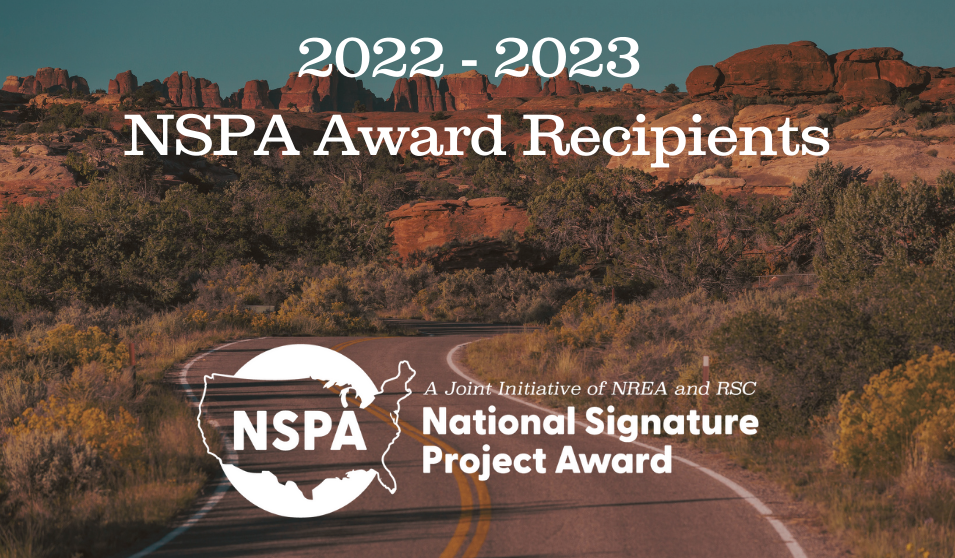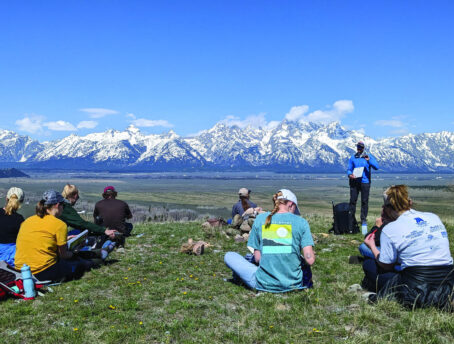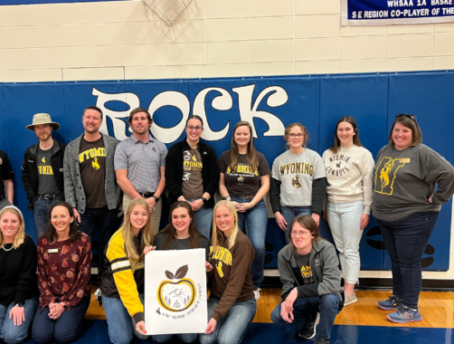Each year, the National Rural Education Association (NREA) and Rural Schools Collaborative (RSC) accept applications for the National Signature Project Award (NSPA), a $2,500 grant to an outstanding and innovative classroom project that exemplifies the very best in place-based education. This year, for the first time and due to the vast amount of incredible place-based education project proposals, RSC and the NREA have chosen to award two additional rural teachers with $1,500 toward their individual place-based education projects. The National Signature Project Award is open to any rural classroom teacher in the United States.
Rural Schools Collaborative and the National Rural Education Association are proud to announce Lara Belice, a Cooke City School teacher in Montana, as the 2022 National Signature Project Award recipient for her place-based project, "United States History Through a Bison Lens."
This is the first year that Rural Schools Collaborative and the National Rural Education Association have announced runner-ups for the National Signature Project Award! Our NSPA runner-ups are Abby Jones, a Gibbon Public Schools teacher of Gibbon, Nebraska and Christina Robinson, a Randolph Southern Elementary School teacher of Lynn, Indiana.
About Lara Belice - National Signature Project Award Winner
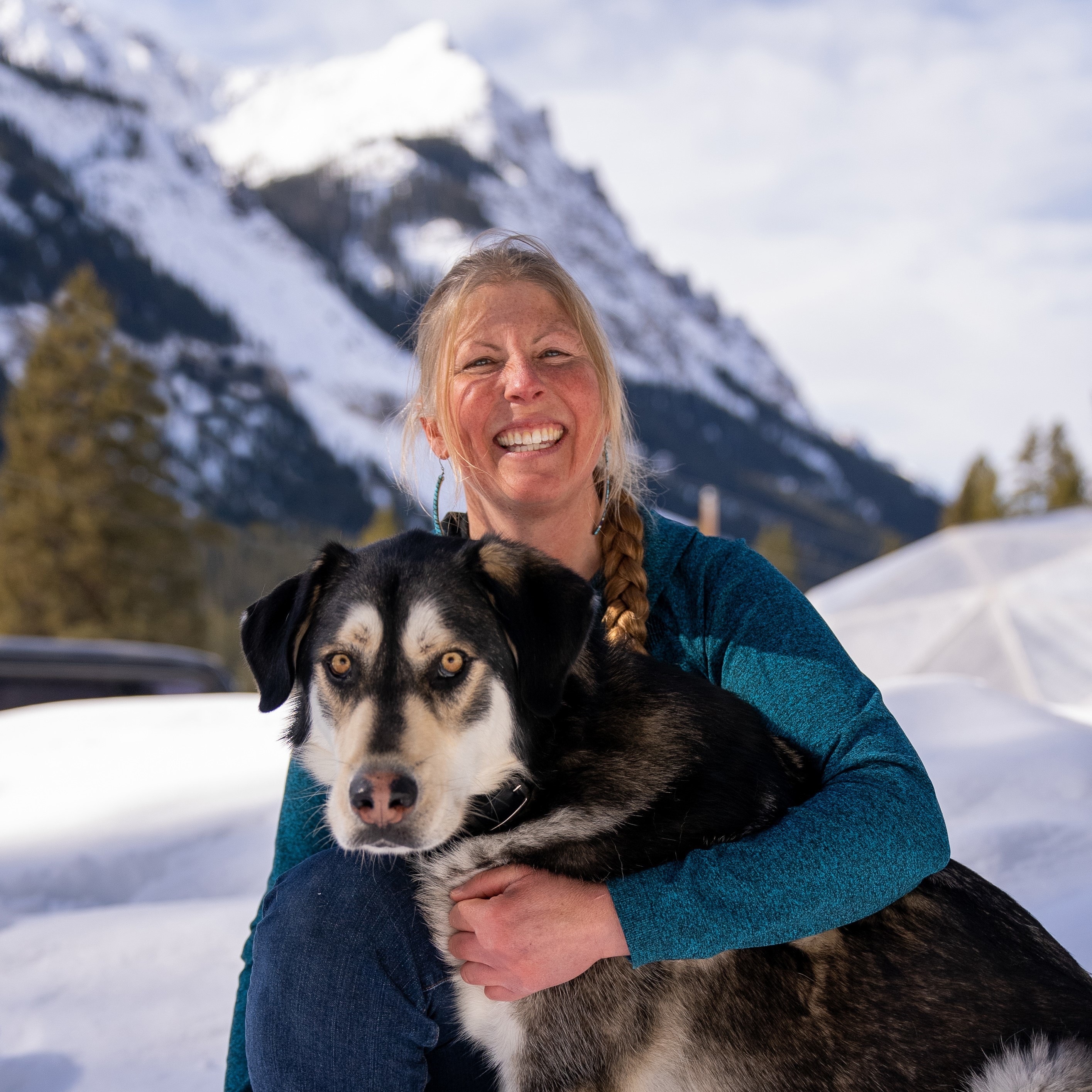
Born and raised within walking distance to the ocean, in San Diego, California, Lara is inspired by vast open spaces. An avid hiker and explorer, she fell in love with mountain landscapes at an early age, knowing that when she grew up, she would choose to live in the mountains. After completing her 80-day teaching practicum at Hawthorne Elementary School, in Missoula and fulfilling a mid-year teaching contract at Cayuse Prairie Elementary School, located at the base of the Swan Mountains in the Flathead Valley, Lara accepted a position at Cooke City School in Cooke City for the 2018-19 school year. And, in April, Lara was honored as the 2022 Montana Rural Teacher of the Year by the Montana Association of County School Superintendents.
Since becoming the lead teacher at Cooke City School, Lara has implemented numerous place-based educational connections to the Greater Yellowstone Area, such as multi-night backpacking outings and nature hikes, ski touring, wildlife viewing with local field experts, and visits to historical sites and world-class museums, to engage her diverse group of students in learning that is personally relevant to their lives.
Last year, with the incredible help of her students and community, Lara oversaw the completion of a closed-loop food system at the school, building a 26 foot diameter geodesic dome greenhouse to permit year-round gardening at an elevation of 7,600 feet. A project that took over two years to complete, beginning in 2019 when she installed a composting system to withstand the extreme cold and wildlife that are an everyday occurrence at Cooke City and with the intent that it would someday nourish a future greenhouse. The completion of the closed-loop food system has had a tremendous impact on the school and community. In a location where the nearest grocery store is a one and a half hours drive, students and the community are now able to contribute compostable waste, which is used to produce vegetables for the school and community. Her love for the outdoors, her students, and her community are evident.
Lara’s “U.S. History through a Bison Lens” Project:
Cooke City School is located four miles from the Northeast Entrance to Yellowstone National Park (YNP); living with bison roaming year-round throughout the Cooke City-Silver Gate-Colter Pass areas where they live; and six months of the year, when making town trips to buy groceries, residents have to pass through herds of bison in YNP.
Beginning the year with an annual multi-day backpacking trip into the Beartooth Wilderness, students will synthesize their experiences in the high country to the geology and ice patch archaeology later discussed in the classroom and seen in museums. Outings into YNP will occur throughout the year, to observe bison both for studies of ecology, biology, physiology, and art. Field observations will be taken in field journals and the notes used for various classroom projects.
Wildlife ecologist and professional local artist, George Bumann will join the students both in the field (YNP), in the classroom, and in his Gardiner, MT art studio. Bison expert Jim Garry from Crandall, Wyoming, will be a guest speaker in the fall and hopefully again in the late spring, and local ecologist and certified guide, Jesse Logan will join the students for a ski outing in YNP to make winter observations.
Through STEAM projects, students will investigate the physiology of the bison. Students will create mathematical models to represent various bison data. Map reading skills and distances will be incorporated as well as basic shapes discussed for making quick in-field sketches and as the first step to creating a clay bison sculpture. Educational trunks offered through various museum sources on Native Americans’ connection to bison, the prairie ecosystem, and the Anzick Burial site will bring hands-on learning into the classroom. Together, students will build a visual timeline to be displayed at the local Post Office. The opportunities to incorporate interdisciplinary place-based educational principles into a “U.S. History through a Bison Lens” yearlong unit of study are endless.
About Abby Jones - National Signature Project Award Runner-Up
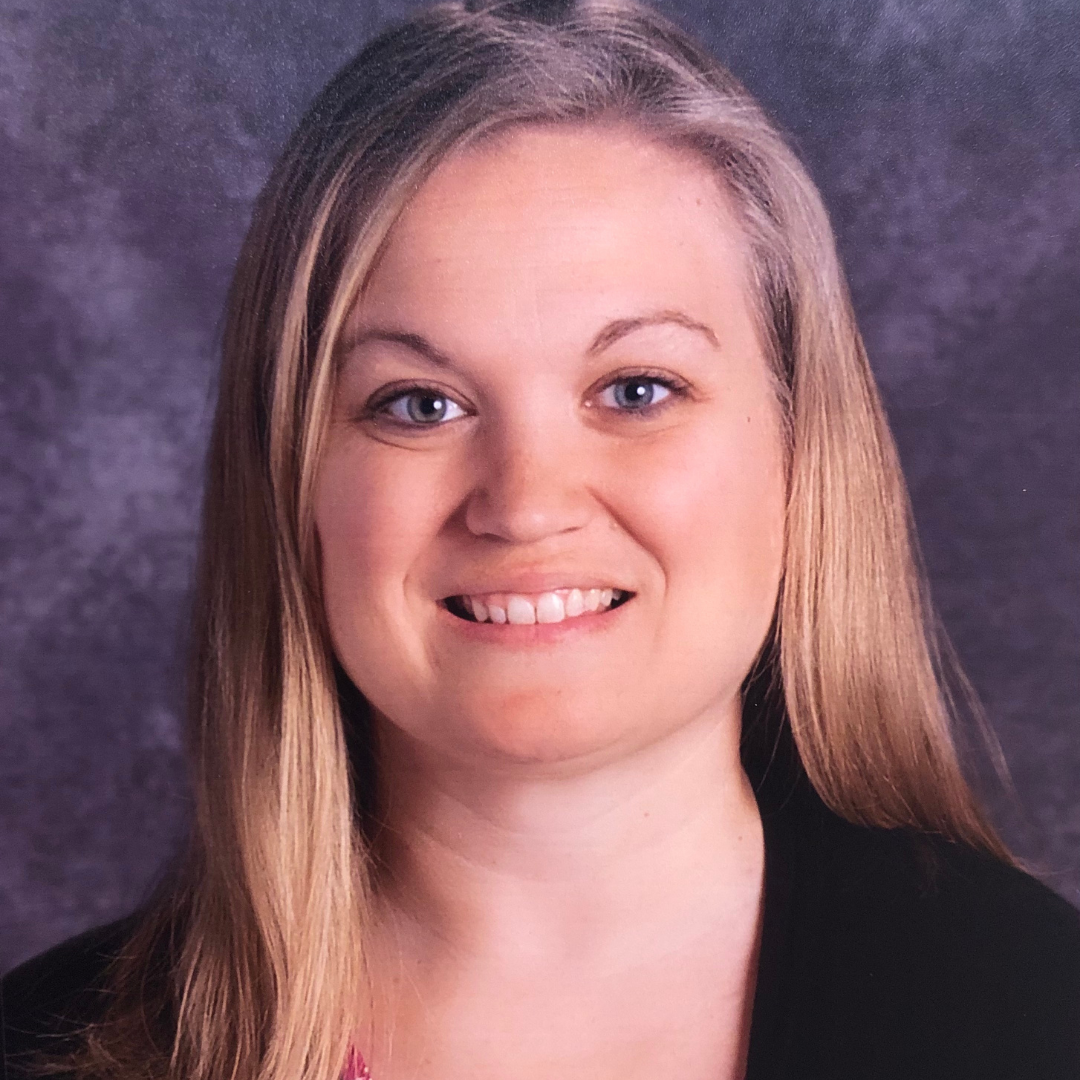
Abby Jones has taught for 18 years and is in her 11th year at Gibbon Public Schools where she teaches Spanish 1, 2, 3, 4, and Pathways to Success; she also sponsors the Foreign Language Club, Quiz Bowl, National Honor Society, and Senior Class. Jones is a member of the Nebraska and Gibbon Education Associations as well as the Sherwood Foundation Cohort, she also volunteers as a Bible School teacher and interpreter for bilingual services at Kearney eFree Church.
Of the 545 students at Gibbon Public School, 48% are Hispanic and 53% are eligible for free and reduced lunch. This project will give migrant students and students with Spanish-speaking parents the opportunity to celebrate and share their native cultures in our school. Jones is passionate about outside-of-the-box projects and is excited for her Spanish IV students to develop a greenhouse through the National Signature Project Award: “It is my passion for students to achieve more success in their lives than they ever thought possible.”
Abby’s “Flavors & Foliage - An International Greenhouse at Our School” Project:
The goal of the Flavors & Foliage project is to bring the flavors and foliage of Spanish-speaking countries back to the Gibbon Public School. The project will create a place-based learning opportunity for the students that will promote Spanish language acquisition as well as benefit the students and the community now and in the future. The project will begin in the fall of 2022, and Jones’ students will start by researching plant life in different Spanish-speaking countries.
Working in small groups, students will determine which seeds they want to plant, ultimately planting seeds from different Spanish-speaking countries. Students will study and document the growth of the plants (in Spanish and English), grow enough produce to cook different authentic dishes, collaborate with Buff’s Cupboard (Gibbon Public School’s food/clothing pantry) in order to provide fresh produce to low-income families, and learn about canning produce.
Jones and her students will travel to multiple greenhouses to learn more about planting and how the agricultural side of the project will work, including a planned visit to two commercial greenhouses and at least one other school (Boone Central in Albion, Nebraska). Jones will invite several local people into the classroom to speak about the canning process with the students, ideally giving students the opportunity to take home and share several cans of food from the greenhouse. Students will also tour two authentic Mexican restaurants in the school’s community to learn how the restaurants make tortillas and prepare meals.
This project provides students with the opportunity to learn “on location” in the greenhouse and will successfully provide students with both educational and workplace skills by furthering their knowledge in the following areas: Spanish, World Geography (with an emphasis on Spanish-speaking countries), Agriculture, and Family Consumer Science.
About Christina Robinson - National Signature Project Award Runner-Up
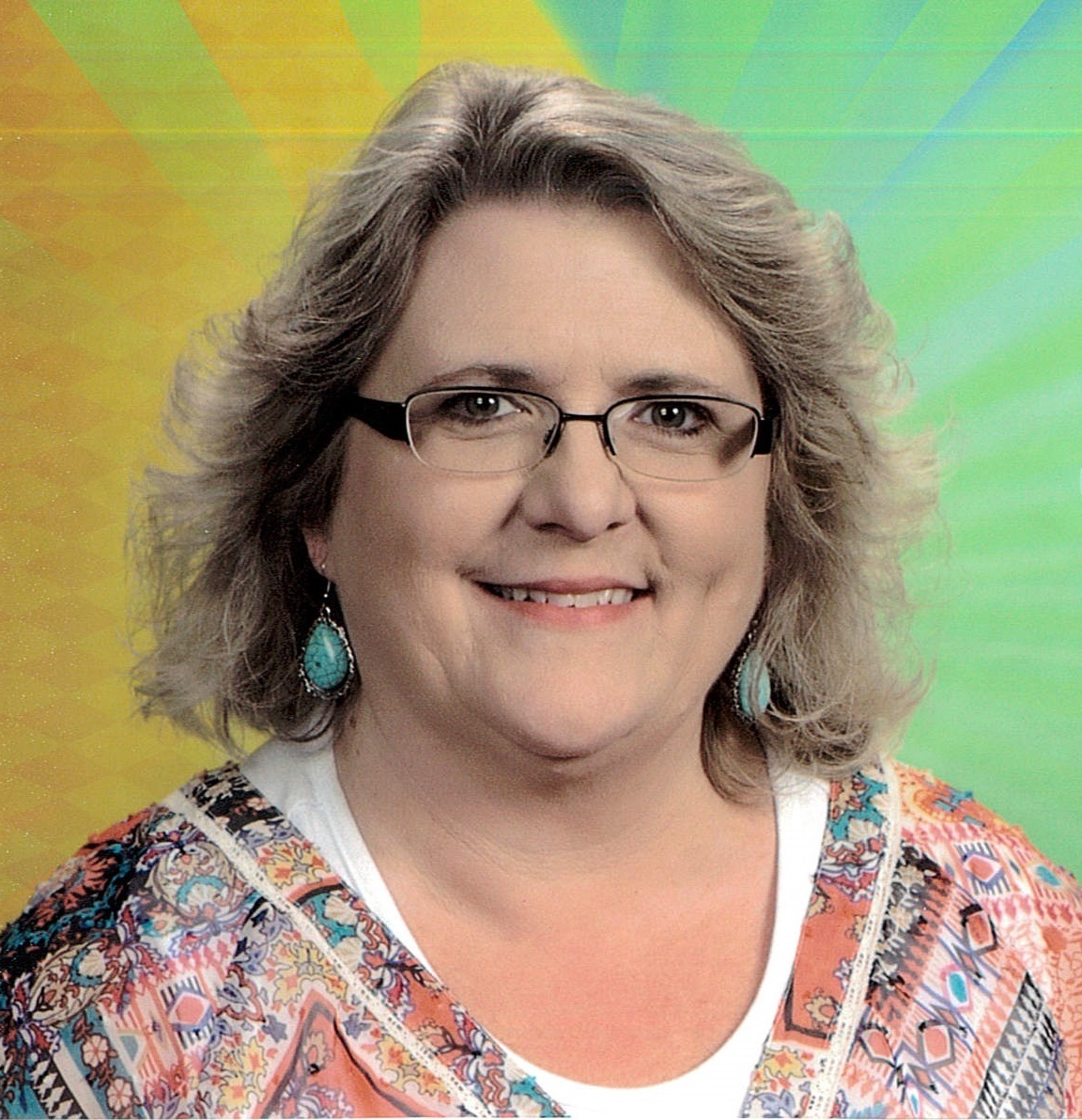
Chris is a 30 year-veteran at Randolph Southern Elementary School where she has taught her entire career in various grades (currently 5th grade!). She has loved being part of this small rural community in which she was raised and attended school, while growing up on an Angus farm, with her parents owning and operating an agri-business. Chris' passion comes from giving back to the community that is so important to her. Along with teaching, she enjoys working with youth and has been a 4-H leader for over 25 years. She is the proud mother of Brittany, Sean, and Zoe, and loves spending time with her 5 grandkids.
Chris’ “RURAL (Randolph Southern Understanding Rural Agricultural Links) from Farm to Fork” Project:
The Farm to Fork project utilizes place-based principles to synthesize learning with student-centered field trips, hands-on experiences with experts in the field, creating items by using the by-products that students are learning about, and creating life-long relationships. This project’s curriculum will be personalized as all the components are within a 15-mile radius of the school and the rural areas in which the students and community live. The Farm to Fork project will be broken into seasonal units:
Fall - Dairy Focus: Students will go on field trips to Sickels' Holsteins Farm and Dragoos' Jersey Farm to learn about the production of milk and different breeds of animals. Students will make homemade butter and ice cream in the classroom, and journal the things learned about the dairy industry and the people they met along the way.
Winter - Tree & Forest Focus: Students will be introduced to the “Goods from the Woods” curriculum. There will be field trips to a local tree farm and Frank Miller Lumber Company to learn about growing trees for resale and the process of turning trees into lumber and other materials that will be used by consumers. Students will also learn about the paper making process and by-products, such as nuts, cinnamon, maple syrup, and toothpaste. Students will make pancakes with syrup and varnish wooden cutting boards at the end of the unit.
Spring - Poultry Focus: Students will discuss eggs, fertilization, incubation, hatching, and production of poultry. The field trips will consist of visiting a farm to see an example of backyard egg production as well as a visit to a local commercial poultry facility to observe the differences and similarities. Students will set up incubators in the classroom for the students to watch the cycles and hatching of the chicks. Students will work hand in hand with our local Poultry 4-H members and FFA to house and feed the chicks until they go home with students or patrons in our community.
At the end of the school year, students will participate in 4-H Animal Science Projects. Students will create storyboards about each “Farm to Fork” topic covered in the school year (dairy, poultry, and forestry), sharing their knowledge with the community through 4-H posters. Students will also attend the Animal Science Project judging in July.
The Farm to Fork project will benefit both Randolph Southern students and the surrounding community. Randolph Southern School is located in Lynn, Indiana and on the extreme east central border, by the Ohio line. The school’s entire student population K-12 is 477 students. The county is very agriculture driven with large farms growing corn, soybeans, wheat, and hay. The livestock that is the most populous is beef, dairy, swine, sheep, goats, and poultry. A total of 96% of the 5th graders at Randolph Southern are rural kids. To emphasize the connection of our learning experience, this project will empower students to be able to be advocates for their own rural community and be passionate about staying or returning to their roots in years to come. This place-based adventure in learning will encourage and show students how to reach their full potential in a rural community.
Lara Belice is the fifth National Signature Project Award recipient, following last year's selection, Haley Salitros Lancaster of Lincoln High School in Vincennes, Indiana. In 2020 Connie Michael of Crow Agency Elementary on the Crow Reservation in Montana was the National Signature Project Award recipient, and in 2019 Devon Barker-Hicks of Idaho, and in 2018 Andrea Wood, from Moorcroft, Wyoming. Belice will receive an award of $2,500, which will be applied to her incredible place-based project! This is the first year The Rural Schools Collaborative and National Rural Education Association have awarded two additional projects, Abby Jones and Christina Robinson will be awarded $1,500 towards their individual place-based education projects.

